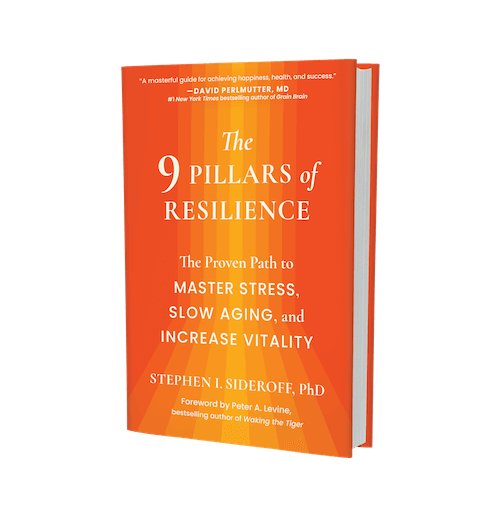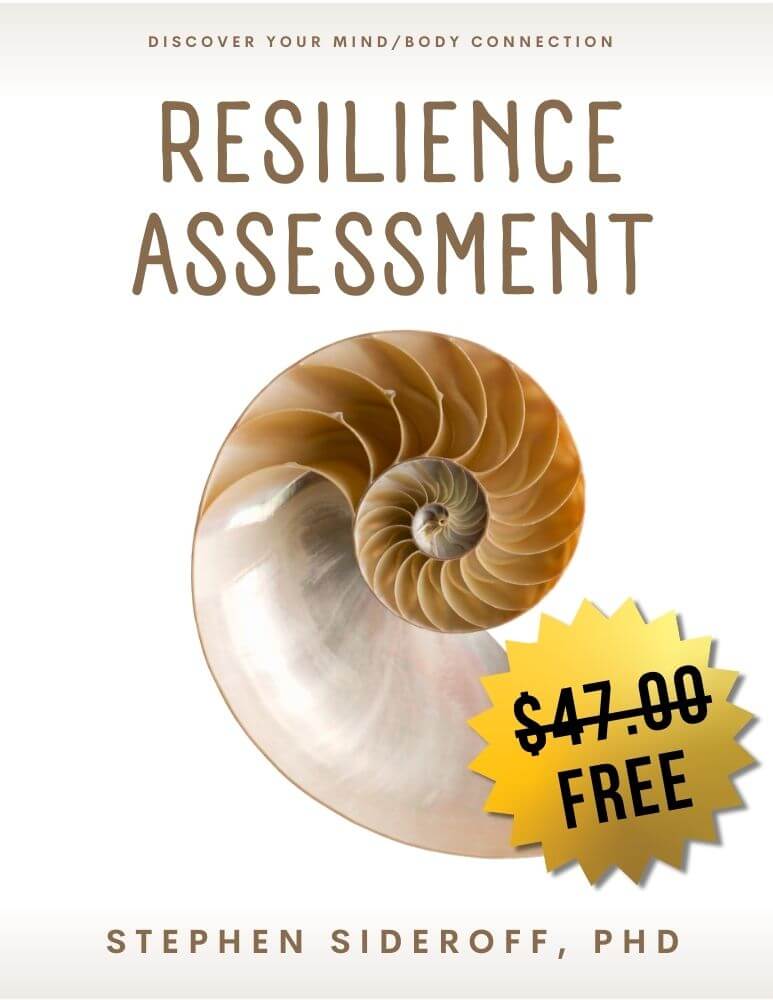[et_pb_section fb_built=”1″ fullwidth=”on” _builder_version=”4.3″][et_pb_fullwidth_header title=”How being more resilient can help protect your health.” button_one_text=”Click Here” _builder_version=”4.3″ hover_enabled=”0″]
It’s easy to feel helpless as we all face this invisible enemy. It’s an enemy that we can’t shoot and can’t mobilize our vast armies to overcome. But wait, we do have a major internal force — in fact, our own army — that we employ in our own defense. This is our immune system. We deploy an array of immune cells such as Killer T cells and white blood cells that attack invading germs. And the healthier our immune system, the more effective it is against these invaders. So, fight back by keeping your immune system in its best shape. There are steps you can take to ensure the optimal functioning of this primary line of defense.
The Mind-Body connection
The mind-body connection is not just a theory. Modulation of the immune response — our defense against infection — is mediated by a complex network of signals between your nervous system, endocrine system, and immune system, as well as your emotions. Stressors — events that pose a threat — through their impact on two major systems, can cause immune system dysregulation. These systems — hypothalamic/pituitary/adrenal (HPA) and sympathetic/adrenal/medullary (SAM) — release hormones in conjunction with negative events and negative emotions. Just one example is the release of cortisol that can provoke multiple adverse immunological changes when prolonged.1-3
Your mind-body doesn’t have unlimited resources and is always making choices of where to send its energy. One of the basic choices is between defend and protect, or maintain, heal, and grow. Since survival trumps everything, when you think there is danger — real or imagined, immediate or future — defend will take priority. Unfortunately, it’s not necessarily with your immune system, it’s the “fight or flight” response. This is OK when you mobilize for a finite, time-limited event. But it’s a different story when you string too many of these finite stressors together.
The current coronavirus threat is a danger to your immune system for three reasons: The danger is real and serious, there is no clear end date, and there is a lot of uncertainty. This lends itself to an ongoing and intense stress response that doesn’t make you safer, while providing little time for recovery.
Let’s all fight back
Think of the many cells in your body that make up your immune system — your own personal army. Just as our country, state, city, and localities are mobilizing and husbanding resources to deal with the pandemic, let’s think of how each of you can best prepare your army of immune cells.
One of the keys to keeping your immune system strong is keeping your nervous system in balance; meaning the two branches of this system: sympathetic that activates and parasympathetic that fosters recovery (of body resources). In fact, there is some evidence that the people at greatest risk for serious consequences of the virus are those whose nervous system is out of balance, such as those with cardiovascular illness. Stress can also impact respiratory vulnerability.
Below are five steps that will help keep your nervous system in balance, foster your ability to self-regulate and maximize immune system functioning:
1. Foster a sense of control and positivity during this crisis.
Your most effective mindset is one that fosters a sense of control. Here are the components of an optimal mental approach:
Experience this crisis as a challenge to be overcome. It’s easy to shrink from or hide from the dangers facing you. And this might be your normal tendency. This leaves you feeling helpless and even more stressed. Furthermore, by avoiding, or mentally running away, you give yourself a negative message of being incapable of addressing the situation and ultimately incapable of meeting your own needs. This causes a downward spiral in self-confidence. If, instead, you take the challenge to face the difficulty, be proactive, and decide, “I’m going to embrace this challenge,” you cultivate trust in yourself, contributing to resilience.
Decide that this is an opportunity to learn and grow. This is a challenge to learn from. If you think about your life journey as one of self-discovery, what can you be learning from this experience?
Reach inside to find your strength. This is a challenge to go deeper inside and it needs to be an ongoing process. Clients ask me, “What am I looking for when I do this?” “How will I know if I’m doing it right?” Think of a tall tree. The taller a tree wants to grow, the deeper and stronger must be its roots. The tree never asks; “Am I reaching into the earth correctly?”
Try to be optimistic and hopeful. This is an opportunity to cultivate positivity. Optimism and hope will help strengthen your immune system. While it’s difficult to be positive during these times, finding what you can be positive about will reduce the impact of the stress. Of course, there are many concerns, but once you address your worries, let them go for the moment, and shift into a more positive attitude. Think of what you have to live forward to.
Train yourself to separate out the “problem” from your response to the problem. You are figuring out what actions you need to take during this difficult time. But few of these actions will require elevated heart rate, blood pressure and tense muscles that are part of the fight or flight response. Instead, you want to awaken to the moment to notice your response, label it as not the most effective, decide you can take the necessary actions or planning while getting into the state of what I refer to as “calm focus.” This is where you train yourself to stay calm and focused while taking action. Say to yourself, this “calm focus” will help me keep my immune system fortified.
2. Allow for your feelings, experience them and let them go.
Don’t ignore your feelings and emotions, as they don’t go away on their own. Here are a few steps to address your feelings:
Be willing to experience them even if they are uncomfortable. Your only other choice is to push them down or ignore them. This leads to greater anxiety and possibly depression.
Allow your feelings to come to the surface. Don’t judge them as bad or negative. Instead simply accept them as part of your current reality. This will make it easier to sit with them.
Feel your feelings. Accept them and be accepting of your current circumstance — not that you like them, but simply accepting them as reality. Allow them to move through your body. We don’t hold feelings in our heads.
After sufficient time — this is subjective but certainly after 10 minutes — make the decision to switch your focus to something positive in your life and let go.
If you have difficulty, this very likely can be due to anger that has not been recognized or addressed. Even though there might not be a target for this anger, express it anyway (but in a safe and harmless manner). And then see if it’s easier to let go.
3. Get and give emotional support.
Everywhere you hear, “keep your distance,” and “social isolation.” In this time of “no gatherings” and staying at home, it’s a challenge to be in relationship. Yet, relationship is so important in our lives. We are social beings. We develop in relationship to others; we thrive in part from the support and love that we share with others. Positive relationships and positive social contact help us self-regulate physiologically. In facing this crisis, we can lose sight of this fact.
If you have others that you are living with, make sure you are not taking them for granted. Take time to let them know you appreciate and love them. If you are having a conflict, recognize that with all the other stresses in your life, you don’t need to add to this by maintaining a conflict. Find a way to let go, forgive and resolve anything getting in the way of loving and feeling warmly toward each other.
Make a checklist of the important people in your life and then begin reaching out. We are avoiding most contact, and that includes most of our close relationships. When you reach out, make sure that your communication goes beyond worry or concern about today’s situation. Shift into positive connections of love, care, appreciation and even plans to get together when this crisis is over.
Don’t get hijacked by the feelings of others. You will come in contact with many who are anxious or overwhelmed by the current crisis. It’s easy to absorb the tension and fear they show or express. Actively tell yourself, “I don’t have to take in this negativity. I can find ways of staying positive.”
4. Exercise to relieve body tension.
When we mobilize with our “fight or flight” response, we tense muscles and raise heart rate and blood pressure. This makes it difficult to relax. Also, if we are experiencing negative emotions such as frustration or anger, this too can keep your body activated. Exercise is a good way to release this energy making it easier to then relax.
5. Resilience requires your body to experience recovery.
For your body to go into a recovery mode, it needs to feel some sense of safety or relief from danger. While there is danger outside, you want to set aside time to say: “In this moment I am safe. I can let down my guard in order to relax and recover.” Practice some form of relaxation or meditation each day within this framework of safety, for the purpose of giving your body the opportunity to recover from the stress of this crisis. Even if you have isolated yourself, the stress is insidious. It creeps in through the media, the internet and, of course, your awareness of what the outside world is going through. Here is a link to a relaxation and visualization I created specifically to help strengthen your immune system.
Dr. Sideroff is the author of The Path: Mastering the Nine Pillars of Resilience & Success.
References
1. Glaser, R. and Kiecolt-Glaser, J.K., Stress-induced immune dysfunction: implications for health. 2005 Nature Reviews/Immunology Vol 5; 243-251
2. Kiecolt-Glaser JK, Glaser R, Christian LM. Omega-3 fatty acids and stress-induced immune dysregulation: implications for wound healing. Mil Med. 2014;179:129–133. [PMC free article] [PubMed] [Google Scholar]
3. Morey, J.N., Boggero, I.A., Scott, A.B., and Segerstrom, S.C., Current directions in stress and human immune function. Curr Opin Psychol. 2015 Mar 1; 5: 13–17. doi: 10.1016/j.copsyc.2015.03.007
[/et_pb_fullwidth_header][/et_pb_section]

